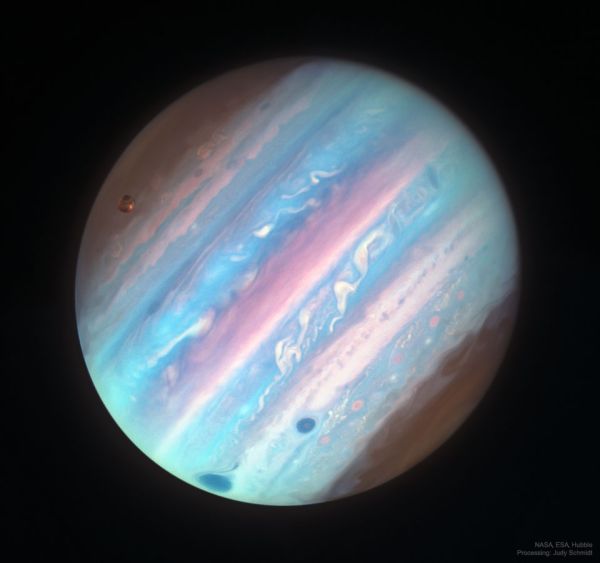Transgender astronomers speak out about outdated name change policies

An open letter to a scientific journal has sparked a conversation around diversity, inclusion and safety in the astronomy community.
When scientists publish their work in a journal, they do so under their name. However, people change their names later for a number of reasons, and there remain policies in place at some journals that prohibit authors from changing or correcting the names they have listed on previous publications. This might result in confusion or career difficulties for some, but for transgender scientists, it could cause very serious safety issues.
In June, a working group of scientists organized by astronomer Emily Hunt, a Ph.D. student at the University of Heidelberg in Germany, put together an open letter to the board of directors of the journal Astronomy & Astrophysics (A&A). The letter followed an incident in which the journal explicitly denied a name change request from a transgender astronomer, citing the publication's policy, and this open letter addressed that denial and the scientists' concerns with such policies. Since the open letter was published, A&A has decided to change the policy.
You can read the open letter where it was posted by Hunt on Twitter. As of June 13, within just a few days, the letter reached over 900 signatures, Hunt shared on Twitter.
Related: Nonbinary astronomers need better support from their field, study finds
People change their names for a multitude of reasons — for example, after getting married and deciding to change their last name. However, as the authors of the open letter make clear, restrictive name update policies at scientific journals can have much worse consequences for trans scientists who change their names and need to correct their previous names, or "dead names," in prior publications.
This open letter, which specifically called for a policy change at A&A, argued that these policies don't just need to be changed to allow retroactive name corrections, but also that the process should remain confidential to ensure the safety and anonymity of the author.
Sign up for the Live Science daily newsletter now
Get the world’s most fascinating discoveries delivered straight to your inbox.
"If a paper has your old name on it, then every time you tried to promote your research, you're having to out yourself, and it wouldn't be a very pleasant thing to have to go through," Hunt told Space.com. Hunt added that there can also be added danger "when people go and do science in countries that are less accepting or have collaborators from countries that are less accepting."
"The denial of name update requests on manuscripts causes major and unnecessary difficulties for trans academics," the open letter reads. "They may either decide not to list works published under a past name in their CV, which prevents them from receiving full credit for their past work and may limit their career progression. This also hurts the accuracy of the scholarly record, as it divorces works from their authors."
However, aside from detailing just how such policies may interfere with scientists' professional careers, the letter also shows how this could significantly endanger these authors.
Related: Women of color in astronomy face greater degree of discrimination, harassment
"If trans academics decide to include works published under a past name, it will forcibly 'out' them as trans. This would put them at risk of discrimination or harassment, particularly in places with limited or no legal protections for trans people," the letter reads.
The letter cites multiple published reports that emphasize the importance of allowing authors to change or correct their names on previous publications. The letter additionally points to a Nature piece by Tess Tanenbaum, an assistant professor of informatics at the University of California, Irvine, which stresses the issue.
While "a lot of journals have implemented name change policies," Hunt said, "a lot haven't.". She added that authors who have requested updates to their names on previous publications have not only been denied but have even been met with curt or negative responses.
Slowly, however, some publications are changing their name update policies.
"Last year is when a lot of journals around the world in so many different areas of science started changing their policies," Hunt said.
The Committee on Publication Ethics (COPE) has even shown support for name update policies for transgender authors and is working to develop guidance for publications, the letter cites. Policies have so far been changed at publications like AAS journals, Science, IOP Publishing, Wiley and Elsevier. Such policies are being changed at places like Monthly Notices of the Royal Astronomical Society (MNRAS) and Nature Astronomy, according to the letter.
A&A, whose publisher (EDP Sciences) is a COPE member, has decided to change its policy following the publication of the open letter.
"I am pleased to tell you in advance to the formal publication, that the A&A Board has approved a few days ago that the publication policy would be updated for supporting retroactive name changes. With this, A&A expresses its commitment in respecting the rights and identities of authors, reducing or removing barriers to inclusion and author credit," André Moitinho de Almeida, the Chair of the Astronomy & Astrophysics Board of Directors, said June 28 during the award ceremony of the annual meeting of the European Astronomical Society. This change should take place early next week, an A&A representative told Space.com.
Small changes like this are certainly a step forward but remain a symptom of a larger problem in the scientific community, Hunt said. "Not everyone in science isn't just a cisgender, straight white man; there's actually a wide range of people. And we want to have an even wider range of people, too, because it makes us stronger, and it's just fairer, and a better way of doing things," she said.
However, she added, in some journals, "I don't think anyone has probably stopped and looked and thought, 'OK, how much training do we have in place? Do we have a diverse group of editors? Do we have diverse people on our board of directors?... Does everyone have a good understanding of equality issues?'"
Hunt said that she hopes that journals don't just stop with changing these name update policies, but also "take a look at how they can stop this happening in the future," and how to be better "clued in" about issues regarding diversity and inclusion. While she points to these policy updates as something that is relatively easy to fix for these journals, "there are a lot of bigger problems in astronomy and wider academia as a whole that are much harder to fix," especially for people from minority ethnic groups and who are part of the LBGTQ+ community.
Email Chelsea Gohd at cgohd@space.com or follow her on Twitter @chelsea_gohd. Follow us on Twitter @Spacedotcom and on Facebook.
Chelsea Gohd joined Space.com as an intern in the summer of 2018 and returned as a Staff Writer in 2019. After receiving a B.S. in Public Health, she worked as a science communicator at the American Museum of Natural History. Chelsea has written for publications including Scientific American, Discover Magazine Blog, Astronomy Magazine, Live Science, All That is Interesting, AMNH Microbe Mondays blog, The Daily Targum and Roaring Earth. When not writing, reading or following the latest space and science discoveries, Chelsea is writing music, singing, playing guitar and performing with her band Foxanne (@foxannemusic). You can follow her on Twitter @chelsea_gohd.











